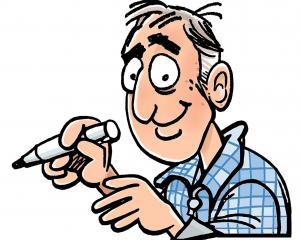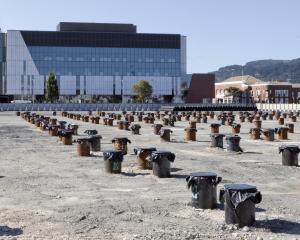Well, we never. A University of Otago study shows students who drank heavily were impaired physically and cognitively the next day.
What's more, "extreme drinking produced the most detrimental effects". Such drinking was associated, we are told, with the least sleep, feeling the least refreshed, excessive tiredness and a higher incidence of feeling ill. It was also associated with poor concentration and impaired workload management.
Pardon us, but isn't that what is commonly called a hangover?
Isn't the outcome of such a study as obvious as the nose on a drinker's face?
Does it take a psychology department survey to tell us what we already know?
Of course, the thousands of people living in the colleges and flats of North Dunedin will take note of such ground-breaking studies. The sales of booze will dry up.
The Zoo at Forsyth Barr Stadium will became a centre of sobriety and sense, with every student carefully studying every play. Yeah, right! To be charitable, the subject is worthy.
The demon drink needs putting in its place for all the trouble it leaves in its wake, and the reporting of the study, including by this newspaper, reinforces the cautionary tale.
Every day, the effects of alcohol are manifest. In last Friday's paper, for instance, came reports that hundreds of children are injured, killed or abused every year by caregivers who have been drinking.
Rightfully, and with sadness, we tut, tut, tut. Part of us, too, likes being told what we already know. We feel a little smug and a little self-righteous that we are smart enough to be well aware of what took a fancy survey to conclude.
Add the combo of students and drinking, and there is nothing quite like having our prejudices and our stereotypes reinforced.
To be fair to those admirable researchers on this particular occasion, they are following the mantras of their profession.
Nothing should be assumed.
Convictions must be "evidence-based". The seemingly obvious can be, and sometimes is, wrong.
Meanwhile, of course, the lads and lasses who enjoyed the Hyde St revelry at the weekend will hardly have been clear-headed and bushy-tailed - physically and cognitively - when they began their week. The rest of us can begin the week wondering what erudite alcohol study will next grace academia.
Excessive drinking is a strain on budgets?
Binge drinking is likely to be married with unwanted sexual contact and higher rates of STDs?
Extreme drinking leads to more accidents?
Let's have studies to test these radical hypotheses. Let's expand the frontiers of knowledge. Actually, there have been studies into some of these propositions (the TAB, apparently, declined to take bets on the results). While we are at it, what about a study to see if it hurts if you hit your thumb with a hammer?
And does it hurt more if you use a bigger hammer?
• Tonga's future
Tonga's new king, Lavaka Ata, takes over a country facing massive challenges. It is nearly bankrupt, exports next to nothing and has a largely undeveloped tourism industry. Tonga's 176 islands (52 inhabited) are spread across 7000,000 square kilometres and 70% of the 100,000 people live on Tongatapu, the main island. It relies on aid, including $18 million a year from New Zealand, and remittances from about 100,000 Tongans living abroad, notably in Australia, New Zealand and the United States, and is highly indebted to China.
Tupou VI's power will be far from absolute. King George Tupou V, prompted by riots and pressure, moved towards democracy in 2008.
He gave up much of the day-to-day job of ruling to the Parliament-elected Prime Minister, and 17 seats of 26 in the Parliament are elected by the people. The rest are reserved for the nobility.
Beset with natural disadvantages - the only major asset being the bounty of the seas - Tonga has desperately needed wise and prudent governance. In large part this has not been forthcoming, with some of the worst examples coming from the new king himself. His six-year term as prime minister, in those days appointed by the king, his father, was marked by the collapse of the Tongan airline and various failed schemes. For the sake of Tonga, it must be hoped that he has matured, that he can continue down his brother's path towards democracy, and that Tonga can build a stronger future.












